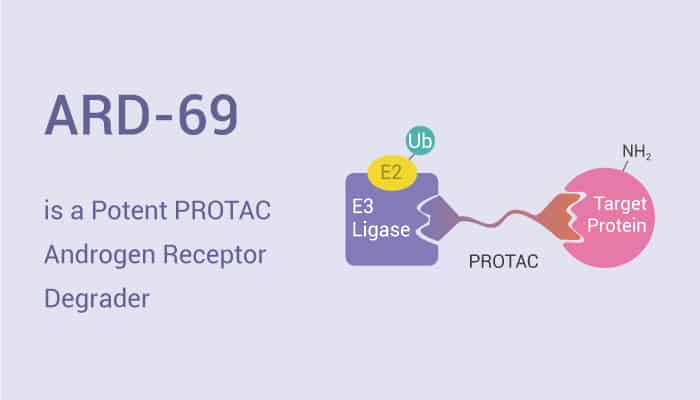Androgen receptor (AR) is a ligand-dependent nuclear transcription factor and a member of the steroid hormone nuclear receptor family. In fact, AR has many biological functions and can control the expression of specific genes. AR can interact with its natural ligands 5α-Dihydrotestosterone (DHT) binds to testosterone. Importantly, AR signal transduction may also be relevant to tumor development. Androgens can play a role in DNA binding-dependent manner through AR to regulate target gene transcription. Androgen functions through the androgen receptor (AR), which is a 110 kDa member of the steroid receptor transcription factor family. Meanwhile, testosterone and dihydrotestosterone (DHT) are physiological ligands of AR. In prostate tissue, DHT is the main ligand of AR, which is passed by testosterone through 5 α- Reductase synthesis.
Nonetheless, protein hydrolysis targeting chimerism (PROTAC) is an effective endogenous protein degradation tool. In particular, it can ubiquitin target proteins through the ubiquitin-proteasome system (UPS), thus achieving the role of tumor growth. The potential advantages of PROTAC technology can make up for the shortcomings of traditional drug therapy, thus promoting its rapid development. Here, we will introduce a potent PROTAC androgen receptor degrader, ARD-69.
ARD-69 is a Potent PROTAC Androgen Receptor Degrader.

First of all, ARD-69 is a potent PROTAC androgen receptor degrader. Obviously, ARD-69 induces degradation of androgen receptor (AR) protein in AR-positive prostate cancer cell lines in a dose- and time-dependent manner. Besides, ARD-69 suppresses AR-regulated gene expression.
In the second place, the DC50 values of ARD-69 in LNCaP, VCaP, and 22Rv1 AR+ prostate cancer cell lines were 0.86, 0.76, and 10.4 nM, respectively. Moreover, ARD-69 can reduce the level of AR protein in these prostate cancer cell lines by more than 95%. Furthermore, ARD-69 effectively inhibits cell growth in these AR-positive prostate cancer cell lines.
Last but not the least, a single dose of ARD-69 can effectively reduce the level of AR protein in xenotransplantation tumor tissues of mice.
All in all, ARD-69 is a potent PROTAC androgen receptor degrader.
References:
Han X, et al. J Med Chem. 2019 Jan 10.